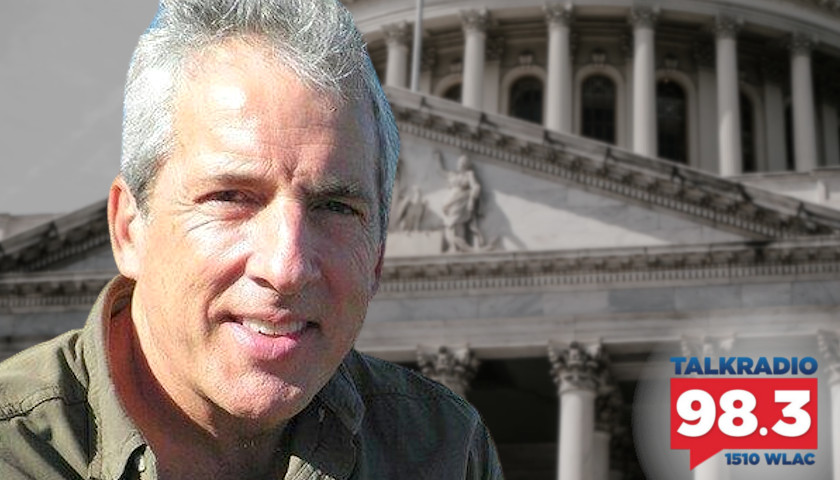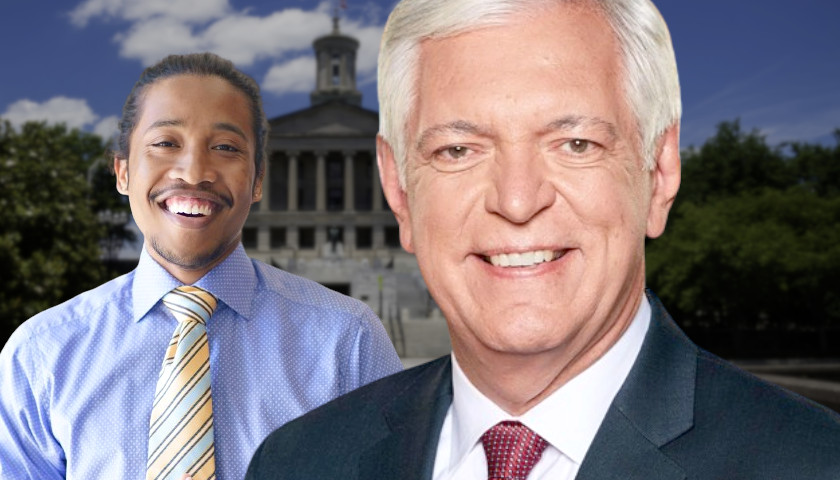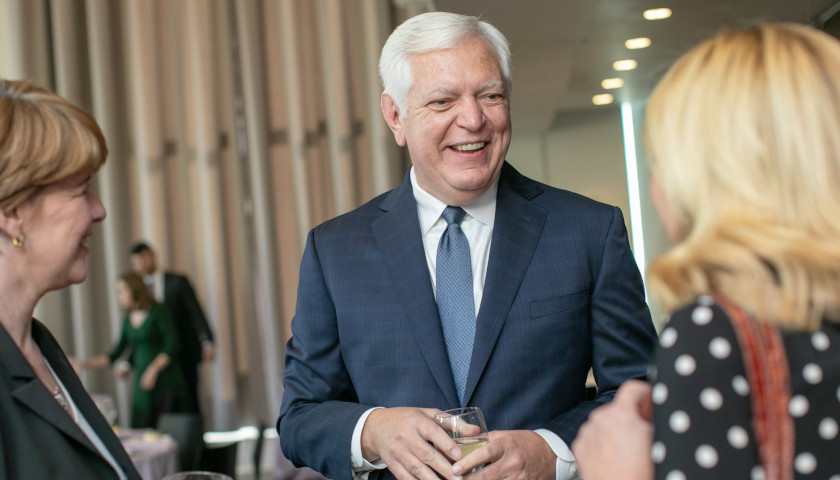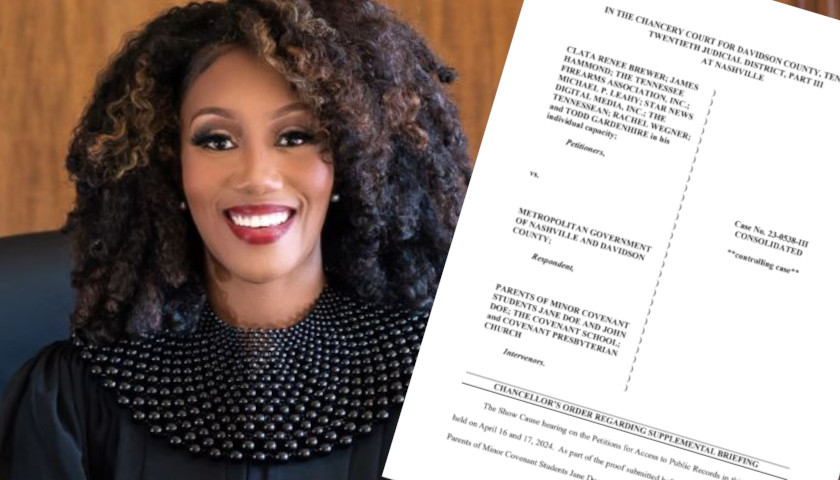Live from Music Row Friday morning on The Tennessee Star Report with Michael Patrick Leahy – broadcast on Nashville’s Talk Radio 98.3 and 1510 WLAC weekdays from 5:00 a.m. to 8:00 a.m. – host Leahy welcomed Blount County resident and Misrule of Law blog creator, Mark Pulliam to the newsmaker line to discuss his recent article at American Conservative called Elite Lawyers Wage War on America’s Cities and the intricacies of the circuit courts that make it possible.
Leahy: We welcome to our microphones, our good friend, retired attorney, now resident of Tennessee, Mark Pullium. Good morning, Mark.
Pulliam: Good morning to you, Michael.
Leahy: You wrote an article we want to talk about. The headline is Elite Lawyers Wage War on America’s Cities. This is at your Misrule of Law blog, a Chronicle of legal and judicial mischief. This could be like 1,000 pages easily if you’re chronicling legal and judicial mischief.
Now the other little thing I would add is you could do probably 100 stories about elite lawyers waging war on America. In various areas. Tell us about your argument here, Mark Pulliam.
Pulliam: The first thing I want to say is people in Tennessee should be very thankful that we are located in the 6th circuit instead of the 9th circuit. So Tennessee, along with Ohio, Kentucky and Michigan, are in a different judicial circuit than California and the Western States, which are in the 9th Circuit.
And so my article, which was in the American Conservative originally focused on a case that my old law firm, Latham and Watkins, had undertaken as a pro-bono project, which means for the public good.
And it basically involved partnering with a legal aid group in Boise to sue the city of Boise, Idaho, because Boise had laws on the books that prohibited people, vagrants, bums, and homeless people from sleeping in the public parks. And they filed this lawsuit.
It took ten years before they finally prevailed. The city of Boise initially won. They took it up to the 9th circuit, where a crazy panel of three judges determined that the law was unconstitutional because it violated the 8th Amendment proscription on cruel and unusual punishment because homeless people don’t have any control over where they live.
It’s a status, not conduct. And this ruling because the Supreme Court declined to hear the case, now affects 1,600 cities in the Western United States that are within the purview of the 9th circuit.
So when you see on TV, pictures, images of San Francisco and Seattle and Portland, and other cities in the 9th circuit in Los Angeles, and you wonder, why are all those tent cities there?
Why are all these people camping in public areas in the squalid drug dens? It’s because the 9th circuit has said that the cities within the jurisdiction of the 9th circuit cannot prohibit it. And so if you can’t prohibit it, it basically becomes unregulated and becomes out of control.
Leahy: Let me as you this question very important question. Why did the Supreme Court choose not to take this case up?
Pulliam: First of all, there are many cases kicking around in the United States each year, and the Supreme Court only decides a relative handful of them.
And so a case could be very meritorious and still not get the attention of the Supreme Court. The other answer and I spoke yesterday with somebody who lives in Boise and teaches at Boise State, and he said that the real reason is the voters in Boise elected a Soros-funded person as mayor.
And the mayor signaled in the legal pleadings filed with the supreme court that the city no longer intended to enforce the ordinance anyway.
So the case became moot. I don’t know that for a fact, but that’s what a professor in Boise is telling me. It sounds like a plausible explanation.
Leahy: So are you telling me that George Soros got a progressive elected mayor of Boise, Idaho?
Pulliam: It can happen anywhere in cities that are most vulnerable. Boise is sort of the bright blue city in an otherwise red state. But unfortunately, because the rest of the state is very lightly populated, Boise is the tail that wags the dog.
Leahy: Wow. That’s kind of crazy. Of course, this is another reason why people are leaving California. And coming to Nashville, Tennessee, and East Tennessee.
Pulliam: Exactly. In the 6th circuit and the rest of the country, other than the 9th circuit, states and cities can still regulate the public areas, which, if you want to avoid chaos, you have to regulate public areas. If you have aggressive panhandling.
If people are able to urinate and defecate in public and sleep anywhere they want, quickly the downtown areas become blighted. And in Tennessee, our legislature has reaffirmed the ability of jurisdictions to regulate so-called camping in public areas.
Not only are people fleeing the 9th circuit because they’ve created a disaster, but Tennessee is actually in the opposite direction. We are willing to enforce these long-standing rules.
It used to be that you couldn’t do a lot of things in public. You couldn’t be drunk in public. You couldn’t loiter, you couldn’t panhandle, et cetera. And as those things deteriorate, the conditions decline.
But so far, that’s not true in Tennessee. And I think ultimately, a case like this will go to the supreme court. And the supreme court will disagree with the idea that there is a constitutional right to live in a squalid drug den in the middle of downtown.
Leahy: What is it about left-wing lawyers who subvert the law by going to amendments of the Constitution and discovering rights and privileges that no one else saw until they went and created them? Like the 14th amendment often is used as the place where these rights and unknown rights just spring up spontaneously.
Listen to the interview:
– – –
Tune in weekdays from 5:00 – 8:00 a.m. to The Tennessee Star Report with Michael Patrick Leahy on Talk Radio 98.3 FM WLAC 1510. Listen online at iHeart Radio.









Ben Franklin’s words of the 18th century are even more accurate today:
“I am for doing good to the poor, but…I think the best way of doing good to the poor, is not making them easy in poverty, but leading or driving them out of it. I observed…that the more public provisions were made for the poor, the less they provided for themselves, and of course became poorer. And, on the contrary, the less was done for them, the more they did for themselves, and became richer.”
― Benjamin Franklin